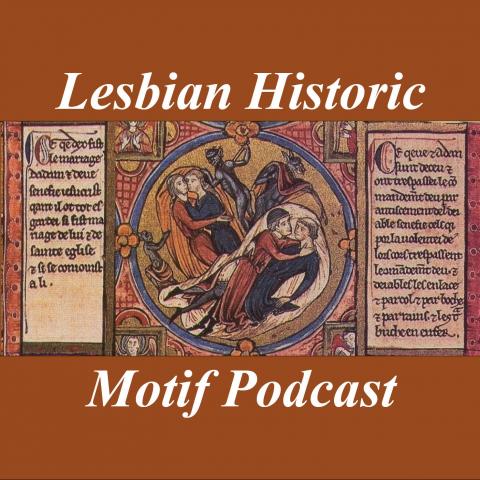Lesbian Historic Motif Podcast - Episode 15c: Book Appreciation with Caren Werlinger
Saturday, October 21, 2017 - 12:41
Lesbian Historic Motif Podcast - Episode 24 (previously 15c) - Book Appreciation with Caren Werlinger - transcript
(Originally aired 2017/10/21 - listen here)
(Transcript commissioned from Jen Zink @Loopdilouwho is available for professional podcast transcription work. I am working on adding transcripts of the existing interview shows.)
Heather Rose Jones: Last week, we had Caren Werlinger on the show to talk about her own historic writing. In this segment, she’s here to talk about historically based works that she particularly enjoyed. So, Caren, why don’t you tell us about some other historic novels with lesbian characters that you have really loved or that were influential on you?
Caren Werlinger: Well, I already mentioned Patience and Sarah as being very strongly influential. It was the early 1980s when I discovered lesbian fiction and one of the other books that stood out in my memory, well, it stood out for me at the time, not just in my memory, as being a book that was so well-written and not necessarily happy, but well-written. And that was The Price of Salt by Claire Morgan. Now we know that that was Patricia Highsmith writing under a pseudonym, but at the time the version that I had was still written under pseudonym of Claire Morgan. Even though it was historical for me then and it would be historical for us reading it now, it wasn’t historical for her at the time she wrote it.
H: Yeah, it was semi-autobiographical as I understand it.
C: It was, it was. But I’ll tell you, when you read that book, when I read it at the time, I was immediately struck by the quality of the writing and the way she put her narrative together and the way she drew those characters. You could feel the connection between Carol and Therese. It was just so far above anything else that I had read at that time. That actually was a book that I knew I would be aspiring to write to. To try and meet that level of literary merit. That really stood out for me.
H: And one thing that both those books have in common, The Price of Salt and Patience and Sarah, is that, for their time, they were revolutionary in not requiring tragic endings.
C: This is true, and I didn’t realize that at the time when I first discovered these novels. I can appreciate that now, knowing more of the history of our literature.
H: I know you mentioned Patience and Sarah in our interview, but why don’t you talk a little bit more about how that book inspired you and what it meant to you?
C: One of the things that really stood out for me was what I thought was a very realistic depiction of the family dynamics, trying to rip the two women apart, trying to rip Patience and Sarah apart from each other. They did, in fact, have to be separated for a while, but when they came back together and they made the decision to leave and to be together, there was no sugar-coating of the hardships they were going to face. They knew that they were going to be facing more prejudice, more hostility from people that… just the physical difficulties of journeying further into what was frontier back then in the early 1800s. I can’t remember the specific year, if it was ever actually mentioned, when that book is set, but I know it was when trying to get west of what is current day Rochester was probably total wilderness. It was just, I thought, a very realistic depiction of the difficulties of two women, who were determined in their love for each other and that determination and that stubborn insistence on holding to each other, I thought was just something that really reached out to me and touched me deeply and it has stayed with me all these years. That’s one of the reasons that book is very special to me.
H: Well, thank you for sharing your classic favorites with us. I’ve really enjoyed hearing what you have to say about them.
C: I know that contemporary romance is probably the best-selling genre in lesbian fiction out there, but I really want to encourage people to reach outside their comfort zones a little bit and pick up some historical fiction and see what you think of it. I mean, a lot of it, you will learn some things, you will learn what it was like for people in other eras, but it will, I think, help to give you an appreciation of how much freedom we do have to be as open as we are now, when you read about the difficulties people faced in past eras.
H: Well, thank you very much, Caren.
C: Thank you, Heather.
Show Notes
In the Book Appreciation segments, our featured authors (or your host) will talk about one or more favorite books with queer female characters in a historic setting.
In this episode Caren recommends some favorite queer historical novels:
Links to the Lesbian Historic Motif Project Online
- Website: http://alpennia.com/lhmp
- Blog: http://alpennia.com/blog
- RSS: http://alpennia.com/blog/feed/
- Twitter: @LesbianMotif
- Discord: Contact Heather for an invitation to the Alpennia/LHMP Discord server
- The Lesbian Historic Motif Project Patreon
Links to Heather Online
- Website: http://alpennia.com
- Email: Heather Rose Jones
- Twitter: @heatherosejones
- Facebook: Heather Rose Jones (author page)
Links to Caren Werlinger Online
- Website: CJ Werlinger
- Facebook: Caren Werlinger
Major category:
